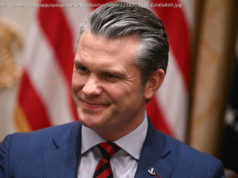A president’s choices for the award say more about his own worldview than about the honorees. This one is no different.
The presidency of the United States may be the most powerful post in the world, but it doesn’t offer much room for self-expression. The duties and requirements mean that the president is often fairly constrained in his choices. The Presidential Medal of Freedom is one of the few areas where he has full creative control. As a result, the honorees, though typically deserving, tend to say less about the country than they do about the presidents who chose them.
John F. Kennedy’s executive order establishing the award offers only this broad guideline: “The Medal may be awarded by the President as provided in this order to any person who has made an especially meritorious contribution to (1), the security or national interests of the United States, or (2) world peace, or (3) cultural or other significant public or private endeavors.”
Read: Bob Dylan receives the Medal of Freedom.
Even Donald Trump, ever the unconventional president, sticks to the pattern set by predecessors in his first picks, who will receive the medal Friday at the White House. In Trump’s first crop, he’ll give the honor to Miriam Adelson, a doctor and GOP megadonor who is married to GOP megadonor Sheldon Adelson; retiring Senator Orrin Hatch of Utah; Alan Page, an NFL Hall of Fame defensive tackle-turned-Minnesota state supreme court justice; Elvis Presley; Babe Ruth; Antonin Scalia, the late Supreme Court justice; and Roger Staubach, the NFL Hall of Fame quarterback.
It’s a motley bunch. The Adelsons have been crucial backers of the president’s. Hatch has, too, saying that Trump could be the greatest president in history. Scalia is a totem for Trump, and filling his seat has been one of the president’s biggest accomplishments. Staubach and Page are classic Medal of Freedom picks—popular athletes with successful post-sports careers—though both have also been sharply critical of Trump at times. And then there’s Elvis and the Babe—the King and the Sultan, the unusual ones.
To see what makes Trump’s batch distinctive, it’s useful to review the people whom his predecessors chose. Take George W. Bush, a product of the conservative movement and a sports fan who famously valued loyalty. Thus Bush’s picks include a number of Cold Warriors or heroes of the post-war era: Vaclav Havel, Pope John Paul II, Edward Teller, and Van Cliburn, though also the former Communist Nelson Mandela. Though Bush’s intellect was often mocked, he chose a number of conservative intellectuals and authors: Robert Conquest, William Safire, Robert Bartley, James Q. Wilson, Irving Kristol, and Norman Podhoretz. He also honored veterans of the Reagan administration, which he revered, including Nancy Reagan and Laurence Silberman.
Bush never seemed all that concerned about seeming cool, and his pop-culture picks reflected that: pre-disgrace Bill Cosby, Andy Griffith (a dyed-in-the-wool Democrat), Fred Rogers. He also picked many athletes, but chose a notably multicultural bunch: Hank Aaron, John Wooden, Roberto Clemente, Muhammad Ali, Frank Robinson, and Negro League legend Buck O’Neil. Of course, as a golf aficionado, he had to include Arnold Palmer and Jack Nicklaus, too.
Finally, Bush chose a great number of people who’d been loyal to him or stuck by him even through some of his notable presidential misadventures, including foreign leaders (Tony Blair, Colombia’s Álvaro Uribe) and government appointees (L. Paul Bremer, George Tenet, Generals Tommy Franks and Richard Myers).
James Fallows: About that Medal of Freedom, Mr. Tenet
Obama’s crew was glitzier, more focused on culture—from high- to middle-brow—and packed with icons of Boomer cool. Despite Obama’s reputation for brains, he picked fewer intellectuals than Bush. There were a great number of athletes, many of them black (Kareem Abdul-Jabbar, Michael Jordan, Willie Mays, Bill Russell). Stan Musial was celebrated for advocating for the integration of Major League Baseball. University of North Carolina basketball coach Dean Smith had been an outspoken liberal. Hollywood was often celebrated—Tom Hanks, Ellen DeGeneres, Robert de Niro, Robert Redford, Cicely Tyson, Steven Spielberg—and so was Obama’s iPod: Bruce Springsteen, Bob Dylan, Stevie Wonder, James Taylor, Diana Ross. There were some upper-middle-brow artists, too, like Frank Gehry and Steven Sondheim.
Ideologically, Obama believed in the power of activism—especially on civil rights—and in the power of government, and both spheres were amply represented. He honored civil-rights heroes (James Chaney, Andrew Goodman, and Michael Schwerner; John Lewis; Shirley Chisholm; Harvey Milk; Native American leader Elouise Cobell) and public servants (Robert Gates, John Paul Stevens, John Dingell, Newton Minow, George H. W. Bush)
There aren’t as many names to go on for Trump, but the picks so far seem to reflect a few things about his personality. One, he is a big fan of celebrities and athletes, who make up four of his seven awardees. Second, he is strongly partisan-minded and highly critical of the press. Obama picked George H. W. Bush; Bush’s son chose Washington Post publisher Katharine Graham and former New York Times editor A. M. Rosenthal. It’s all but impossible to imagine Trump reaching across the aisle or celebrating journalists. Indeed, Scalia was a towering conservative figure and Hatch a Republican stalwart. Adelson is a more peculiar pick. Other presidents have selected campaign donors (Obama and Warren Buffett, for example), but seldom has one picked an honoree who is most famous for political giving.
Still, it’s Presley and Ruth who stick out most. First, they are dead. A very small portion of past picks have been posthumous, and when they are, they tend to be either recently deceased (Scalia, Alexander Calder, John Wayne, Count Basie) or were underappreciated during their own lifetimes (Rear Admiral Grace Hopper, who died in 1992 and was honored in 2016; Martin Luther King Jr.; Chaney, Goodman, and Schwerner). It can hardly be said that either Elvis or Babe Ruth was denied acclaim in their lifetimes. Presley even had his own (in)famous visit to the White House.
One reason Trump might gravitate to the deceased is that living celebrities tend overwhelmingly to oppose him, raising the danger that they would refuse the honor. This year, the Trumps are once again skipping the Kennedy Center Honors gala, usually a staple presidential event, lest they receive a hostile greeting.
But Ruth and Presley also both align with Trump’s “Make America Great Again” philosophy. When the president speaks about returning to halcyon days in the past, he doesn’t name a specific year—both because any particular moment would be prone to critique, but also because he’s referring more to a feeling than to a time.






